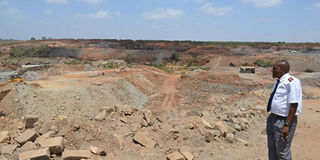Salvation Army church loses Sh1bn claim on land intrusion

The quarry in Murang'a County which the Salvation Army church leased to three miners whom it later sued, accusing them of breaching the terms of the lease. The Environment and Land Court in Nyeri has dismissed the case in which the church sought damages amounting to Sh1 billion from the miners. PHOTO | FILE | NATION MEDIA GROUP
What you need to know:
- The court ruled that the lease agreement between the church and the stone miners is scanty in its contents.
- The judge insisted that the court cannot improve the terms of contract which the parties have made for themselves.
- Justice Kemei said the church failed to give any evidence to show that the agreements were forgeries.
The Environment and Land Court has dismissed a case filed by the Salvation Army church seeking damages amounting to Sh1 billion from three quarry miners.
The church argued that the miners intruded into its land in Murang’a and caused massive environmental degradation.
But Justice Grace Kemei on November 14 ruled that the lease agreement between the church and the stone miners is scanty in its contents and it was, therefore, not clear what terms of the agreement were breached.
CONTRACT TERMS
The judge insisted that the court cannot improve the terms of contract which the parties have made for themselves.
She ruled that the church failed to discharge its burden of proof on claims of breach of the agreement.
The church sued Mr George Gatecha, Moses Ngaru Kinuthia and Anthony Murage Njoroge for excavating stones on its parcel of land measuring 130 acres in Murang’a County.
In the court papers, the church wanted a permanent injunction stopping the miners from dealing with the land.
SPECIAL DAMAGES
It wanted the court to compel the miners to pay for special damages of Sh100,000 being the costs incurred for surveying the suit land.
The church also sought a compensation of Sh900 million for unauthorised use of 128 acres of land as opposed to the just two acres on which the miners had been allowed to excavate stones.
Further, the church wanted an order compelling the miners pay it Sh100 million as compensation for projected costs of the items required to rehabilitate the land due to the degradation caused by the quarrying.
According to the court documents, the church entered into a lease agreement with the miners on two acres of land for purposes of quarrying stones for a period of five years beginning August 1, 2010.
MONTHLY RENT
The miners agreed to be paying monthly rent of Sh85,000 but the same was later increased to Sh135,000 per month.
In furtherance of the said agreement, the plaintiff engaged Geoserve Services to demarcate and excise the area of two acres.
But in breach of the said agreement, the miners defaulted in rent payment and unlawfully extended their quarrying activities onto 128 acres of land belonging to the church.
The miners moved to the other part of the land after exhausting the excavation of stones on the two acres.
ENCROACHMENT
On realising the miners had encroached on other parts of the land, the church issued a demand letter dated October 17, 2017, urging the three to vacate the 128 acres of land but they refused to comply.
The miners also sublet the land to third parties without the consent and knowledge of the church and failed to adhere to environmental protection, leading to the degradation of the land.
In its submissions, the church, through Major Kiliswa testified that the three miners also forged lease agreements on the suit land so as to indicate that the church has leased the whole of it to them.
Mr Kisilwa said he is the manager of the property employed by the church.
The church claimed that the fake agreement increased the terms of the lease from five years to 15 years, and that the defendants had also forged the signature of the leaders of the church.
LAND SIZE
But while dismissing the case, Justice Kemei noted that the two parties had signed two agreements and none indicated the acreage or size of the land under lease for the purpose of mining stones.
“I have seen another contract in respect to two acres which the plaintiff’s witness informed the court that it is a forgery. With this, the plaintiff has not proved any breach of contract at all,” stated Justice Kemei.
FORGERY CLAIMS
In respect to claims of fraud or forgery against the miners, the judge said the church failed to give any evidence to show that the agreements were forgeries.
This, she explained, would have been in form of a handwriting expert showing that the church did not sign the agreement and that the signatures were forgeries.
“None of the people disclosed to have signed the agreement were called to testify,” ruled the judge while finding that according to the evidence tabled, there was no lease agreement between the parties.




